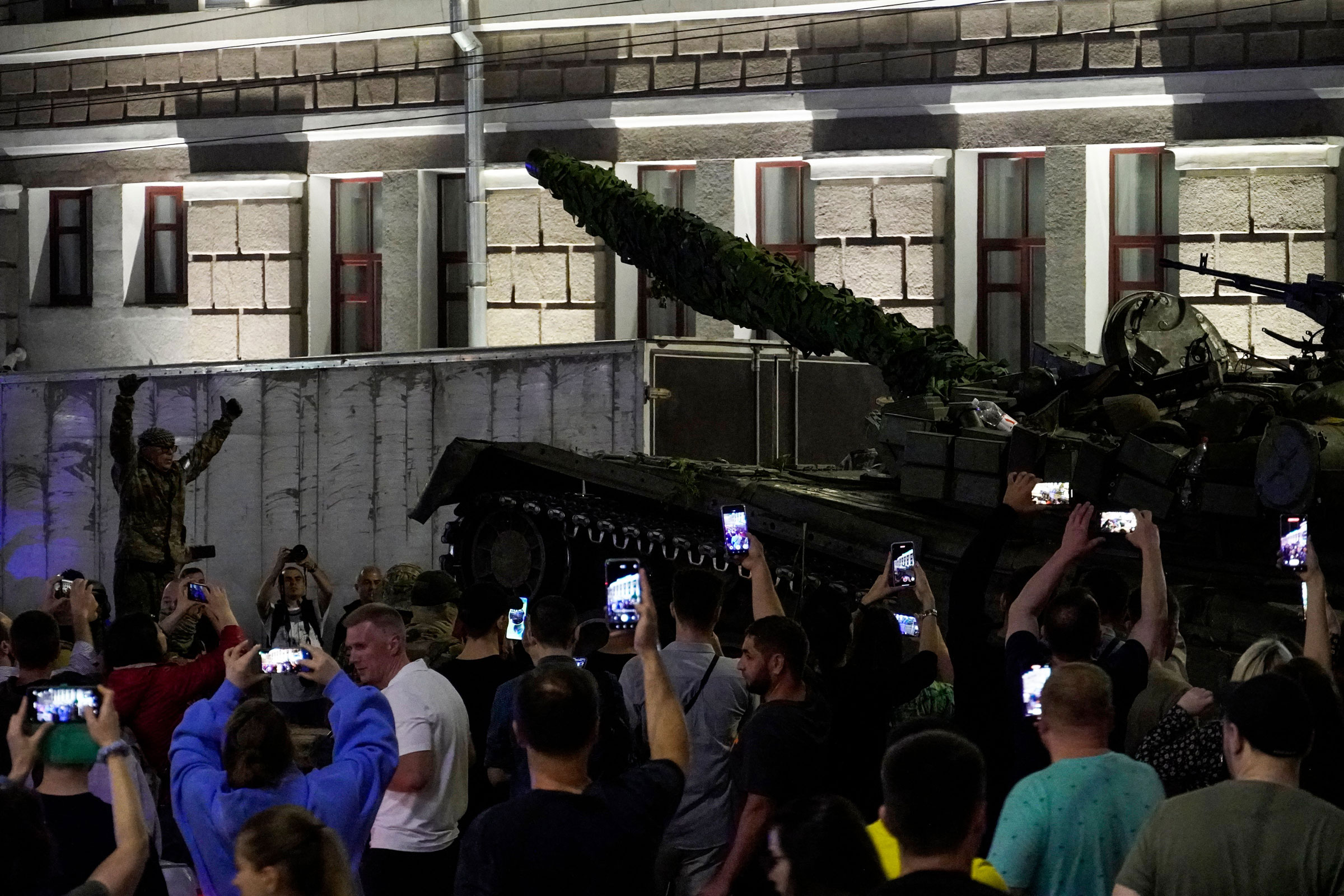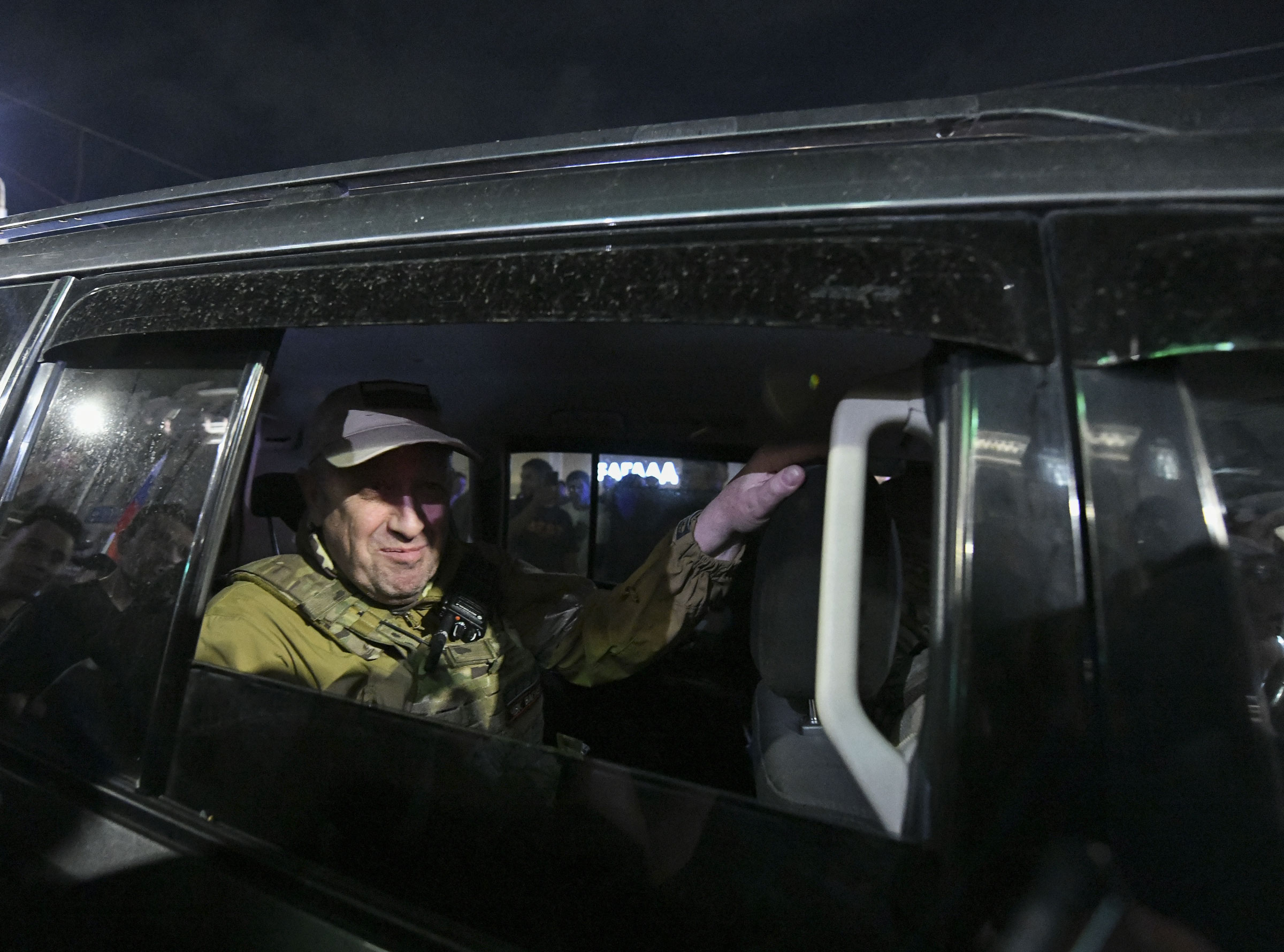A few days out from the Wagner Group’s mutiny against the Kremlin it is hard to know who is the biggest loser. Russia’s President Vladimir Putin looks weaker by the hour as he struggles to manage the fallout. Wagner’s chieftain Yevgeny Prigozhin is possibly somewhere in Belarus now, presumably under some form of lock and key. The mercenary commanders who joined him on his 24-hour march on Moscow are nowhere to be found. Losers aside, all this suggests that the likely biggest winner will be Ukraine.
Still, much remains unexplained. Why did Putin let Prigozhin off the hook? What are the long-term implications? To answer these questions, we have to wind back the clock and examine the precipitating causes.
There are a few ways to look at Prigozhin’s revolt. If you buy Prigozhin’s stated reasoning, the so-called “March for Justice,” was the only logical option after factions in Russia’s conventional forces first deprived Wagner of ammunition and then attacked Prigozhin’s paramilitary cadre as they exited Bakhmut. Putin’s version of the story is that it was a “stab in the back.” In his emergency address to the nation during the crisis, Putin termed it a divisive, “treasonous” distraction from the unity required to achieve victory in Ukraine that revived the fratricidal days of the 1917 Bolshevik revolution. Either way, it appears likely the incident is the first episode in a dramatic finale season long series about the end of Putin’s 24-year-long regime.
Prigozhin said he ordered 25,000 fighters to drive from a Russian cantonment in the southern city of Rostov-on-Don north to Moscow to demand that Russia’s defense leaders explain why they had prosecuted the war so ineptly. The action came on the heels of Prigozhin’s months-long campaign aimed at ousting Russia’s minister of defense Sergey Shoigu and Chief of General Staff Gen. Valery Gerasimov. He blamed them for a failed strategy and for abysmally high Russian casualty rates, channeling frustrations heard all along the frontline and across Russia’s right-wing ultranationalist factions. Now it seems the fate of Shoigu and Gerasimov hangs in the balance, and while Prigozhin and Putin remain alive they will both presumably be looking over their shoulder.

Russian battlefield strategy, Prigozhin complained last spring, lacked the aggressive edge needed to win and dominate. So he and his Wagner Group troops dove in, launching human wave attacks spearheaded by thousands of ex-prisoners over the summer and fall in what he dubbed “Operation Bakhmut Meat Grinder.” When the stark realities of artillery heavy trench warfare began to sink in on both the Russian and Ukrainian sides over the winter Prigozhin then complained that he did not have enough ammunition to break through the line of contact. As early as April, he began signaling that he feared a stalemate or worse was imminent in Bakhmut.
Next came a series of dramatic cry wolf threats from Prigozhin–including a gruesome scene where he shouted at Shoigu and Gerasimov on camera as he stood in a field strewn with Wagner Group corpses. Prigozhin repeatedly said that he planned to pull Wagner forces out of the decimated city in eastern Donbas. He then announced a full withdrawal of his paramilitary contingent at the end of May.
It was then that Shoigu, Prigozhin’s longtime administrative paymaster, saw an opportunity to kill two birds with one stone. A stalemated Wagner Group signaled a vulnerable Prigozhin, and a potential path to finally bringing Russia’s irregular paramilitary contingent under Moscow’s full control. In theory, that could have given Russia’s defense leaders the ace in the hole they needed to beat back Ukraine’s counteroffensive. Shoigu, however, badly miscalculated. Prigozhin refused to sign his forces over, and chaos soon ensued.
Prigozhin’s political base had grown exponentially by that point, and, as my team of researchers at Arizona State University and New America have documented, his powerful propaganda machine had succeeded in rallying millions to his cause online. Shoigu also apparently failed to account for the possibility that he lacked full control over Russia’s security forces. While the waves of military defections Prigozhin had undoubtedly been counting on this past weekend did not materialize Wagner fighters were still able to drive from the southern Russian city of Rostov-on-Don to the outskirts of Russia’s capital on Friday virtually unopposed. Prigozhin seemed to luck out again when agreed on Saturday to a deal brokered by Alexander Lukashenka, the president of Belarus, that called for Putin to drop criminal charges against Prigozhin.
The eleventh-hour bargain also apparently resulted in safe passage and amnesty for Wagner fighters who stayed on the sidelines during the rebellion. In a final blow to Shoigu that he is unlikely to live down, crowds in Rostov-on-Don then cheered Prigozhin as he departed for Belarus. In that brief moment, it appeared that Prigozhin had won by losing. Shoigu and Putin, on the other hand, looked like two men poised to take a long walk off a short plank.

It is doubtful either Putin or Prigozhin counted on this strange outcome. Now Russia, Ukraine, Belarus, and the world await answers about what comes next. It seems like a no-brainer that Ukraine’s President Volodomyr Zelensky will find a way to capitalize on all the instability. Indeed, he said as much in a speech he gave in Kyiv shortly after the Wagner Group mutiny subsided. Zelensky pointedly mentioned that at that very moment, Ukrainian officials were discussing prospects for a peace deal with Russia in Copenhagen, Denmark with leaders from Türkiye, India, Japan, South Africa, and the European Union.
The contours of Zelensky’s “Peace Formula,” as he calls it, are still taking shape, but there is no question that settling the status of Crimea and Russian occupied territories in Donbas as well as reparations and payments for reconstruction in Ukraine will be key to any deal. Now, however, it seems reasonable to ask whether Prigozhin’s reported banishment to Belarus will become part of the horse trading, too. With Putin looking more and more like a lame duck, and an instrument in the hands of squabbling factions of oligarchs and security heavies, Prigozhin could easily become a sacrificial pawn. He might be offered up for prosecution in an international tribunal in exchange for an off ramp from Russia’s war of aggression on Ukraine.
A tribunal may seem wishful thinking, and Prigozhin may have a hard time avoiding strong Kremlin tea as he peers out of open windows. But there is certainly enough concrete evidence of the Wagner Group’s involvement in crimes against humanity in Ukraine, and other hotspots in the Middle East and Africa. Zelensky and his allies in the West, meanwhile, are highly incentivized to ensure that irregular Russian forces are taken off the chess board for good. Either way, there’s no way forward but down for Prigozhin, Putin, and those who have backed them. That does not bode well for stability in Russia or the world.
More Must-Reads from TIME
- Donald Trump Is TIME's 2024 Person of the Year
- Why We Chose Trump as Person of the Year
- Is Intermittent Fasting Good or Bad for You?
- The 100 Must-Read Books of 2024
- The 20 Best Christmas TV Episodes
- Column: If Optimism Feels Ridiculous Now, Try Hope
- The Future of Climate Action Is Trade Policy
- Merle Bombardieri Is Helping People Make the Baby Decision
Contact us at letters@time.com